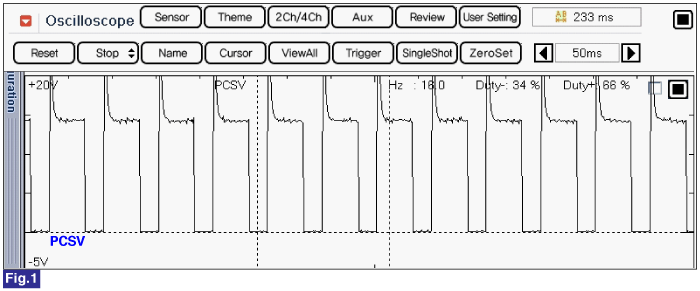

The evaporative emission control system prevents hydrocarbon (HC) vapors from the fuel tank from escaping into the atmosphere where they could form photochemical smog. Gasoline vapors are collected in the charcoal canister. The ECM controls the Purge Control Solenoid Valve (PCSV) to purge any collected vapors from the canister back to the engine for combustion. This valve is actuated by the purge control signal from the ECM and controls fuel vapor from the canister to the intake manifold.
Checking output signals from PCSV every 10 sec. under detecting condition, if signals indicating open or short to ground in the circuit are detected for more than 5 sec., ECM sets P0444. MIL(Malfunction Indication Lamp) turns on when the malfunction lasts till consecutive 2 driving cycle.
Item | Detecting Condition | Possible cause |
DTC Strategy |
•
Open, short to ground | 1. Poor connection 2. Open or short to ground in harness 3. PCSV 4. ECM |
Enable Conditions |
•
Engine running state
•
11V ≤ Battery voltage ≤ 16V
•
Above enable conditions are met > 0.5 sec. | |
Threshold value |
•
Open or short to ground | |
Diagnosis Time |
•
Continous (More than 5 sec.failure for every 10 sec.test) | |
MIL On Condition |
•
2 driving cycles |
Item | Coil resistance(Ω) |
PCSV | 19.0 ~ 22.0Ω ( at 20℃/ 68℉) |



Fig.1) Normal waveform of PCSV under 34% control condition.
Fig.2) Normal data of PCSV under 33% control condition.
Fig.3) Abnormal data of PCSV when PCSV circuit open.
The Purge Control Solenoid Valve(PCSV) is open or closed by ECM and vacuum of intake manifold.
At opening, fuel vapor from canister enters into intake manifold. To prevent vacuum from forming inside canister, ECM controls to open it.
This photo shows the signal waveform of PCSV operating normally.